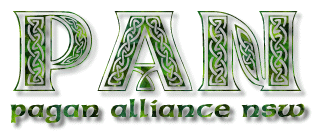|
Sahmain 1998 Newsletter Paganism: An Academic PerspectiveA Discussion and Call For ParticipantsBy Amanda Mckay |

|
Paganism, finally, is the subject of serious academic research in a number of disciplines, especially in the fields of religious studies, sociology and anthropology (e.g., Harvey, 1997: Hume, 1997). The implications of this for the Pagan community are many: recognition by outsiders as a valid religion (remember, it's academics who contribute to the making of a Census), acknowledgment of difference - both culturally and religiously, discussion and debate beyond Pagan circles (with corresponding dissemination of Pagan beliefs and ideas). These are just a few, and I am certain that there are probably more. There are also drawbacks of becoming the 'object' of academic gaze. which a re inherently ethical and need to be considered: who will read the finished product, is the privacy of participants (and their beliefs and practices) considered. what is the research for and who will use it, and of course, why are they asking all those dumb questions'? after al, it is difficult to believe that someone with a very rigid fundamental Christian beliefs researching Paganism would be doing so to produce a well rounded argument...
Having said all that. I believe that it is important and beneficial for Paganism to enter academic debates. I will justify this by introducing my research and myself. I am an honours student in Social Anthropology at UWS Macarthur, and my interest in Paganism stretches back to 1979 when I was 12 and my mother caught me with one of Gavin and Yvonne Frost's books. In fact. it was my desire to explore Paganism that led me into university and a career (I am an employed anthropologist who prepares anthropological reports for Native Title Claims and have gained a great understanding of the issue as a result). If I have an underlying motive in conducting my current research project. it is to ensure that Paganism is widely recognised as a legitimate religion and way of life. Whilst I am sure that mans' Pagans believe they do not need any outside legitimisation of their personal beliefs and practices, gaining recognition and acceptance in the wider community certainly helps fight discrimination misinterpretation (e.g.. "you're worshipping the devil") and assists with legalities such as being able to establish Pagan organisations that are given the same tax free status as other religious bodies. having Pagan celebrants, or even the vision of establishing a Pagan school for children. I wish to make it quite clear that my research. like the research of others such as Graham Harvey (1997). and Lynne Hume (1997), is sensitive to Pagan beliefs and urges others to consider seriously the way they think about not only religion but society itself.
The ideas and questions I have chosen to begin with are "what do Pagans do?", and "What does it mean to be Pagan?". These are very general (I am asking then of all participants). What I am trying to look at is the manner in which Pagans are doing something different from both 'traditional' religion (please read this as 'institutional'), and secular non-religious society. The issue of tradition and its connection to pre-Christian religions is another very important focus of my work, especially as interviews conducted in my pilot study (Fletcher, 1996) indicated a dissatisfaction with today's society. This seemed to be connected with a search for cultural authenticity in the traditions of Anglo-European ancestors and indigenous peoples, as well as a deep concern for reconnection with the natural environment. I believe also, that there are questions to be answered concerning the representation of indigenous peoples' in popular culture and the mass media and their effect upon Pagan practices (i.e.. are Pagans becoming 'indigenous'?), and undoubtedly there is a story to tell regarding the massive influence of the environmental movement upon Paganism.
Further, Paganism itself fee& back ideas and ways of looking at the world to other people in society. A good example of this is the inclusion of Pagan sections in New Age bookstores in suburban shopping centres that would have been regarded as 'too extreme' even five years ago. Here Paganism and its beliefs are becoming well known in the community. Most young people know what Paganism is. This influence could possibly spread one day into Public Policy (well. ..we can always hope.)
If this discussion interests you, and you would like to participate or even just comment, I welcome you. Participation in the project is anonymous. No record of participants names, address or any other personal details is being gathered. You can fearlessly have your say. There are about fifteen questions to answer. and I can send them to you vial e-mail, real mail or interview you personally (if you live near Sydney). My research is to be published as an Honours thesis in October this year and will be available to read if you are interested. I may also present my research at an anthropology conference in October. I will not allow my thesis to be used by any group seeking to harm Pagans. Please consider participating, I believe my research is important for the Pagan community. If you are interested, please contact: Ms Amanda Mckay at 4 Linda Street, Hill Top, NSW 2575, or e-mail her at: afletch@acenet.com.au
References
Fletcher, A.M. 1996, A study of Participants in Alternative Religions in the Sydney Region, Unpublished paper
Harvey,G. 1997, Listening People, Speaking Earth, Kent Town, South Australia: Wakefield Press
Hume, L. 1997, Witchcraft and Paganism in Australia, Melbourne: Melbourne University Press.
![]()